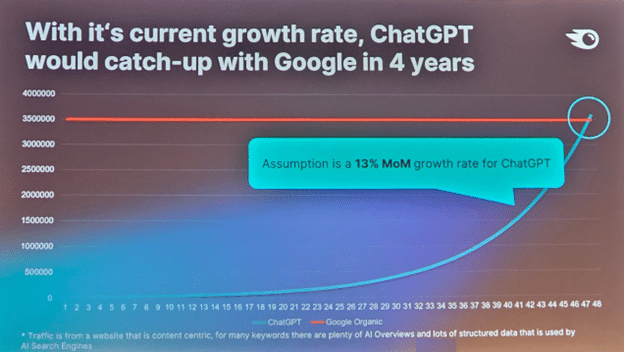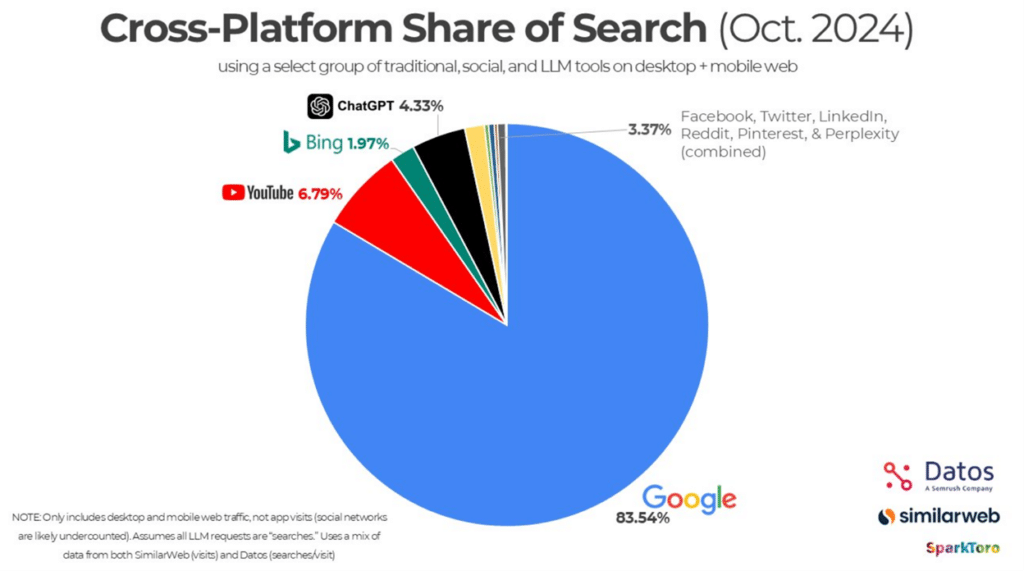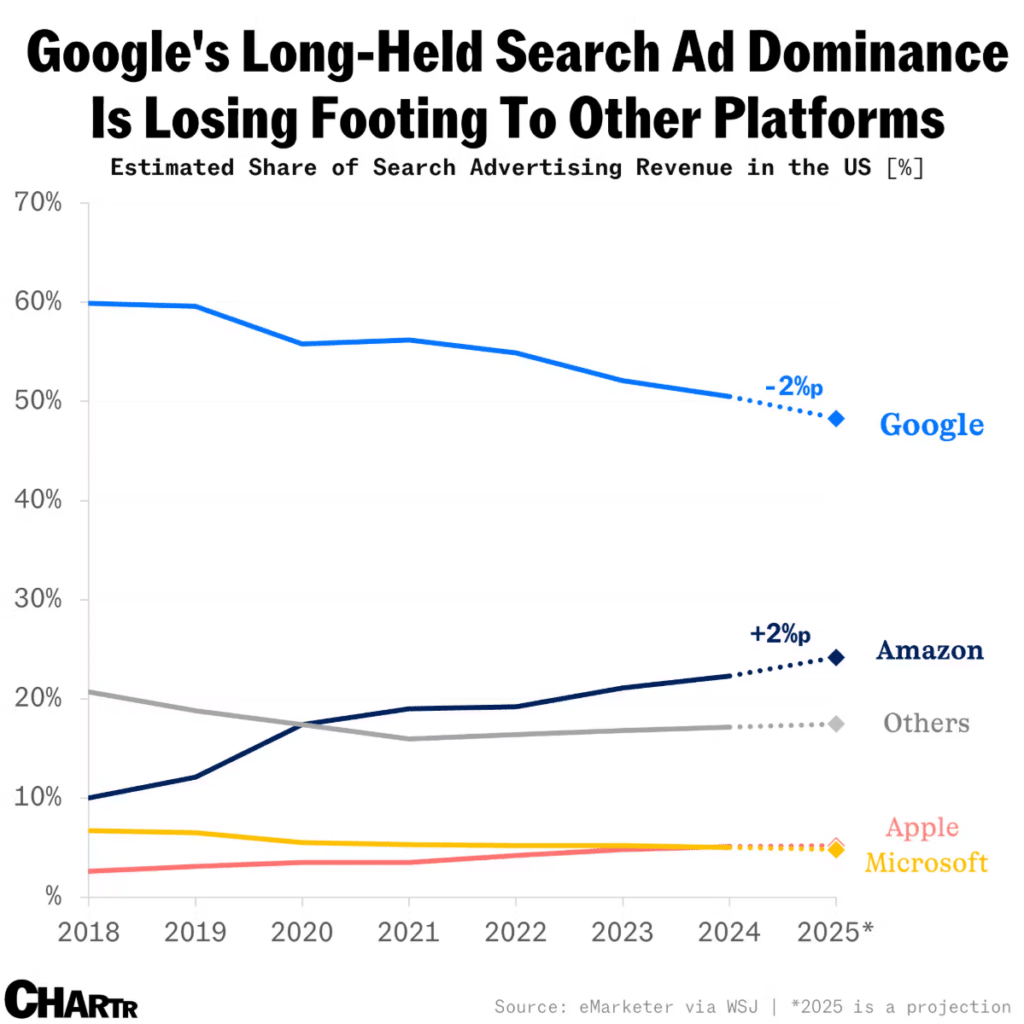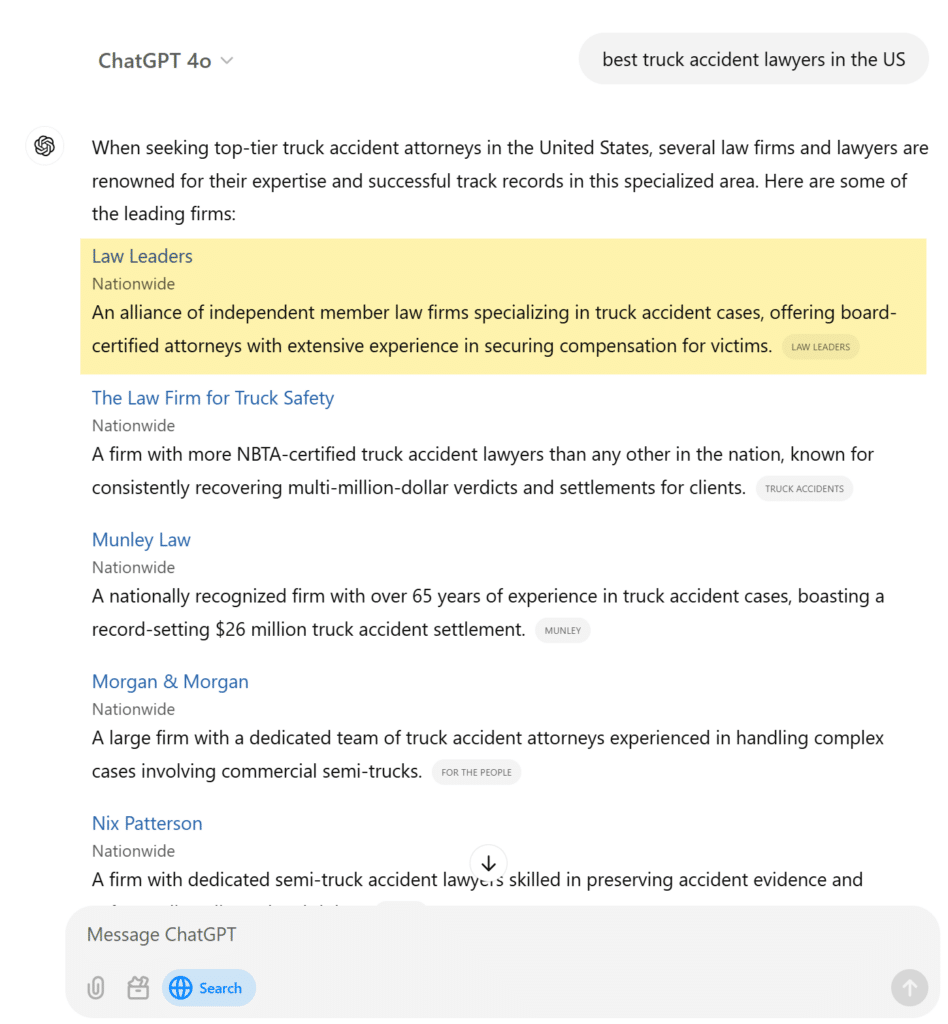
IS GOOGLE ABOUT TO LOSE THEIR SEARCH ENGINE DOMINANCE?
Posted on December 16, 2024 by Law Leaders
For more than two decades, Google has been the clear leader in the search engine market with most attorneys relying heavily on it for lawyer search traffic. Google’s dominance is so extensive that its name has literally become a verb synonymous with searching for information online. However, there are growing indications that Google’s search monopoly may becoming to an end. From the rise of artificial intelligence (AI) competitors to shifting user demographics and legal challenges, Google’s position at the top is increasingly under threat. In this article we will explore the primary factors contributing to Google’s decline and what will likely take it’s place.
The Current State of Google Search
As of 2024, Google still commands an impressive 83% share of the global search engine market. This figure dwarfs its nearest competitors, with Bing holding just 1.97% of the market and newer players like OpenAI’s ChatGPT Search making waves with a 4.33% share. Google’s dominance comes from its complex algorithms, robust advertising ecosystem, and a deeply ingrained user base. The company handles over 8.5 billion searches per day, illustrating its massive scale and influence. But cracks are starting to appear in this seemingly impenetrable fortress.
The Rise of AI-Powered Search Tools
One of the most significant challenges to Google’s search dominance comes from AI-driven technologies. OpenAI’s ChatGPT, for instance, has disrupted the market with its conversational search capabilities. Unlike traditional search engines that rely on providing links to web pages, AI chatbots like ChatGPT deliver direct, contextualized legal answers to user queries without having to navigate traffic away to multiple sources. This shift in how users interact with search platforms is causing a fundamental rethink of what a search engine should be.
According to a report from Search Engine Roundtable, ChatGPT’s integration into various applications has led to a significant uptick in its usage. By offering a more interactive and personalized user experience, AI chatbots are drawing users away from traditional search engines. Gartner’s predictions underscore this trend, estimating a 25% drop in search engine volume by 2026 due to the rise of AI chatbots and other virtual agents – a number that may be significantly underestimated based on more recent data tracked by data scientist at YEXT. Furthermore, a recent study by Gartner also suggests that by 2025, over 30% of online users will prioritize AI-driven solutions over traditional search engines.
Demographic Shifts: Googling is for “Old People”

Another challenge facing Google is the changing preferences of younger users. A Wall Street Journal article highlighted this trend: younger generations are increasingly turning to platforms like TikTok and Instagram for search purposes. According to Google’s own internal research, nearly 40% of Gen Z users prefer using platforms like TikTok and Instagram over Google Search for discovering information. For these users, Google’s text-heavy, link-based search results feel outdated compared to the visually rich and algorithmically personalized content offered by social media platforms.
This generational shift is a problem for Google, as it signals a potential erosion of its future user base. If younger users continue to bypass Google in favor of alternative platforms, the company could face a long-term decline in relevance.
The Impact of Legal and Regulatory Challenges
Google’s dominant position has also made it a target for regulatory scrutiny. Antitrust lawsuits and proposed legislation could force Google to make significant changes to its business model. One notable proposal, as reported by Yahoo News, suggests that Google might be required to divest its Chrome browser, which accounts for nearly 65% of the global browser market. Such a move would significantly weaken Google’s ability to collect critical user browsing data, default search engine preferences, and control the ecosystem through which users access its search engine.
Additionally, ongoing investigations into Google’s advertising practices and alleged anti-competitive behavior could result in hefty fines and stricter regulations. For example, in 2022, Google paid $391.5 million to settle claims that it misled users about location tracking. These challenges could erode Google’s competitive advantages over time.
OpenAI’s Broader Ambitions
OpenAI’s ambitions extend beyond AI chatbots. The company is reportedly developing its own web browser which quit possibly powered by OpenAI’s SearchGPT, could provide a seamless integration of AI-driven search capabilities. If successful, this move could pose a direct challenge to Google’s core business by offering a viable alternative for users seeking an intuitive and AI-enhanced browsing experience.
Furthermore, OpenAI’s existing partnerships and integrations, such as with Microsoft’s Azure and the Bing search engine, are creating a growing ecosystem designed to compete directly with Google. As AI technology continues to improve, OpenAI’s products may capture a larger share of the market.
Big Tech’s Fragmentation of Search
Google’s competitors are not limited to ChatGPT. Other big tech companies are also chipping away at its search dominance. According to Sherwood News, platforms like Amazon, Apple, and even social media giants are encroaching on Google’s territory. For example, Amazon’s product search capabilities make it a go-to platform for e-commerce queries, capturing nearly 40% of the product search market. Apple’s Spotlight and Siri provide users with alternatives to Google for basic voice searches, with Siri handling over 25 billion requests per month globally.
This fragmentation of the search landscape means that users now have more options and more ways to search than ever before. While none of these alternatives currently rival Google’s current market share individually, their collective impact could significantly weaken Google’s hold on the search market.
Google’s Countermeasures
To combat these threats, Google is not standing still. The company has made significant investments in AI, with initiatives like Bard, its own conversational AI chatbot, and Gemini, its next-generation AI model. These tools aim to enhance Google’s search capabilities and provide users with a more interactive and engaging experience. Google’s Gemini AI model is reported to handle over 1 billion interactions daily, showcasing its scale and ambition.
Additionally, Google is focusing on integrating AI into its core search engine to deliver more personalized and context-aware results. The company’s push to incorporate AI into its advertising ecosystem also underscores its commitment to staying ahead in the evolving digital landscape. In 2023 alone, Google allocated $20 billion to AI and cloud computing research and development.
One of the biggest challenges for Google is the disproportionately large amount of monetized search they historically receive from the legal community and how to continue to compete and provide results in a different manner – especially when major AI competitors like ChatGPT Search currently offer legal search results without ads. The whole idea of charging law firms per click quickly becomes obsolete when AI tools now provide dynamic and aggregated multi-source results in one location without the need to click away. This problem is commonly referred to as the “Innovators Dilemma” whereby existing companies built on older technologies struggle to adapt newer disruptive innovations.
Challenges in Retaining User Trust
Despite these efforts, Google faces challenges in retaining user trust. The company’s shift toward more AI-driven search results has raised concerns about the reliability and transparency of its algorithms. Critics argue that Google’s emphasis on AI could compromise the objectivity of its search results, leading to potential misinformation. This ability for AI to potentially “hallucinate” when providing legal information can create a whole new level of reputation and liability issues for these platforms. A 2024 survey found that 45% of users feel skeptical about AI-generated search results, highlighting a trust gap that Google must address.
Moreover, the proliferation of ads on Google’s search results pages has been a long-standing complaint among most users. As alternative platforms offer ad-free or less intrusive experiences, Google’s reliance on advertising revenue—which accounted for $224 billion in 2023—could become a huge liability with no clear alternative path that can make their investors comfortable.
The Future of Search

The search engine market is undergoing a seismic shift, driven by technological advancements and changing user behaviors. While Google remains the dominant player, its position is now under the greatest threat in their existence. The rise of AI-powered tools, demographic shifts, regulatory challenges, and competition from big tech all point to a future where Google’s grip on search is in rapid decline.
That said, it would be premature to count Google out entirely. The company’s vast resources, innovative capabilities, and deep integration into the digital ecosystem give it significant advantages. Whether these strengths will be enough to fend off the growing threats remains to be seen. It is clear however that the financial juggernaut that is Google search is based on more traditional models of information transmission that are quickly becoming obsolete and relatively inefficient due to AI.
We know from third-party tracking data and reliable sources that Google search is declining while ChatGPT, although a fraction of the market, is growing rapidly and based on some estimates could overtake Google search in a little as four years. Naturally this is not something Google would want to share with their investors but it is a very real reality and something lawyers need to take note of – especially if you rely on Google for any portion of your new client generation efforts.
In conclusion, the question is not whether Google will lose its search engine dominance but rather how, when, and how fast it will adapt to the rapidly changing landscape. The next few years will be critical in determining the future of search and Google’s place within it.
 1-800-LAW-Leaders (529-5323)
1-800-LAW-Leaders (529-5323)